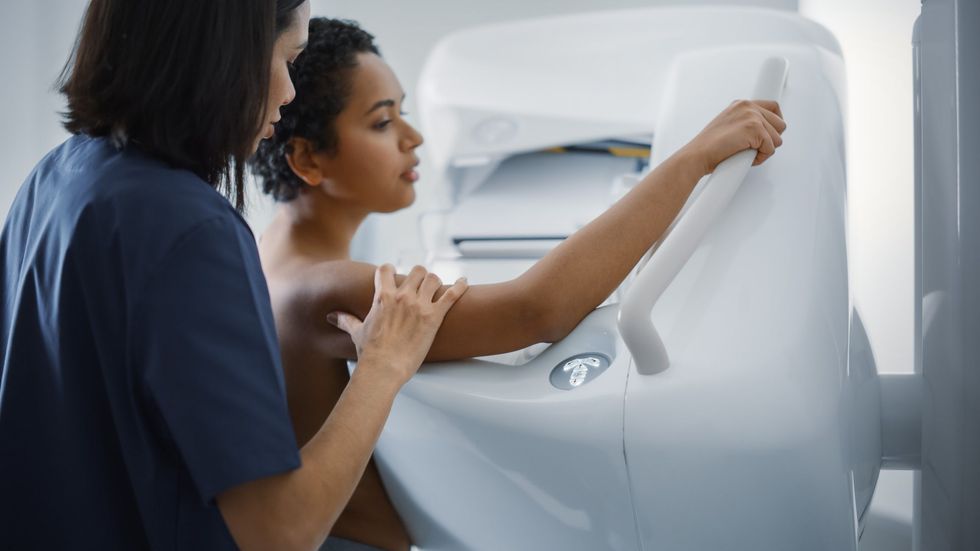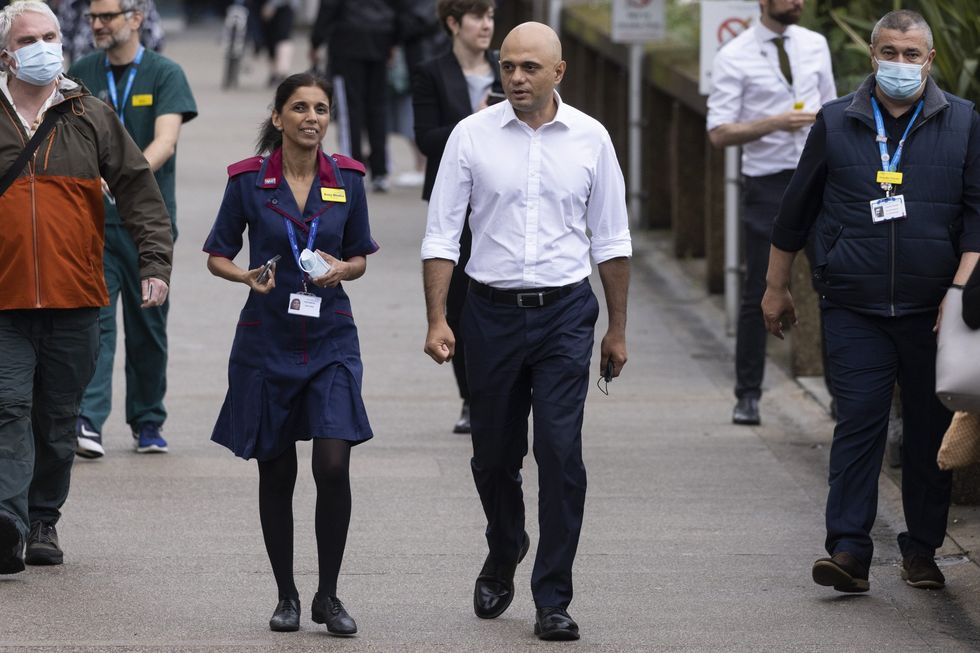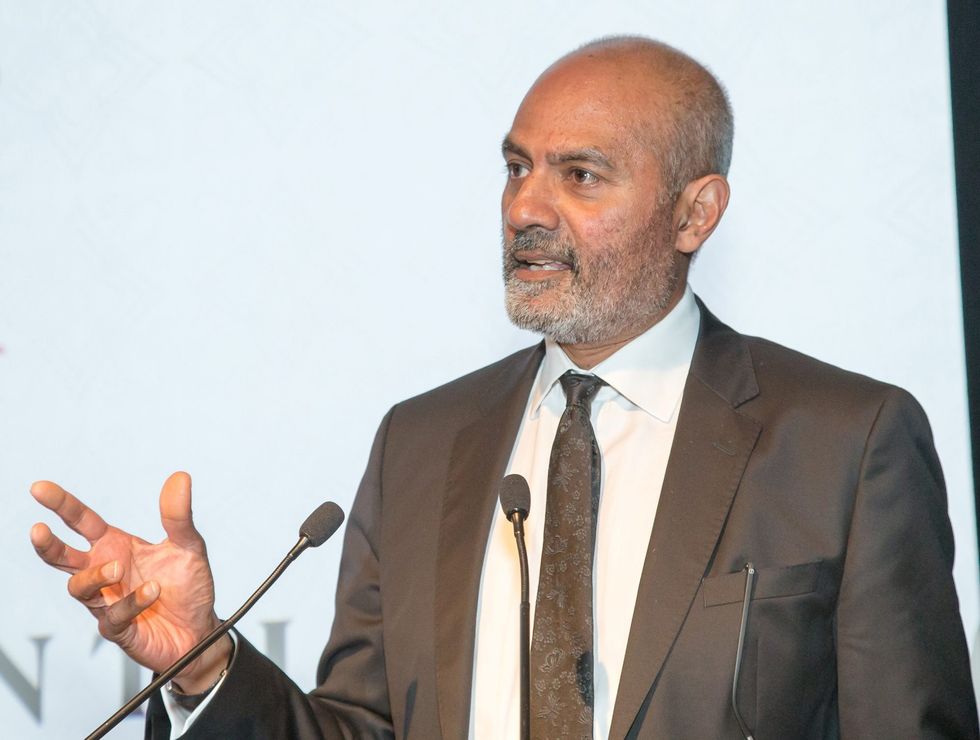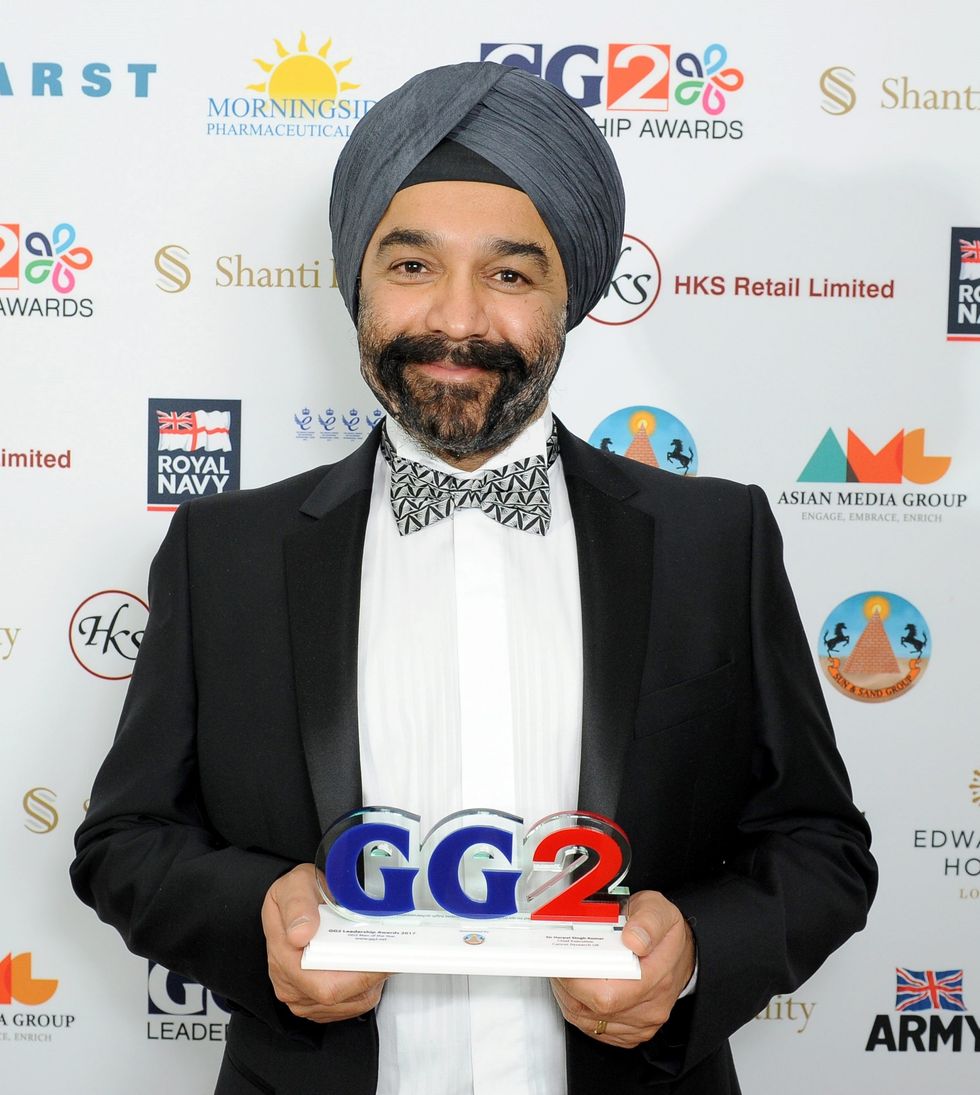SOUTH ASIAN men and women owe it to their families to get tested for cancer.
That is the stark message from Britain’s top south Asian newsreader, George Alagiah.
The BBC journalist, who was born in Sri Lanka, has lived with bowel cancer for nine years, and he told Eastern Eye that he was “lucky to be alive”.
“Given what I know about the treatment, it is not fun, it is very, very challenging,” he said.
“I’ve had about five operations.
“We’re talking huge operations, the liver, the guts of the colon and so on, and we’re not talking about keyhole surgery or anything like that, this is proper full on surgery.
“The recovery that goes with that, the pain and then just the treatment itself, chemotherapy is, for the most part, a very, very blunt instrument.
“The side effects, the fatigue, the nausea, even things like your skin cracking and nails in your fingers and toes bleeding.
“But you get to that point when you think this isn't the cancer, but some of the side effects are physically debilitating.
“For people to think it through, if I caught this early, especially with something like bowel cancer, it's eminently treatable.

“One of my surgeons used to call himself a glorified plumber.
“He said that if you caught it very early, when it's maybe at the beginning of a tumour in your colon, it's snip, snip at two ends, and join the two things and hopefully, you've got rid of it, and you may not even need chemotherapy.
“It's when you allow it to develop, then not only are you risking death, but you're also making it much more prolonged and difficult and challenging, not just for you, but the people you love.
“The people around you who are gonna have to support and care for you, it becomes a much, much, tougher job.”
Javid support
The health secretary, Sajid Javid, backed Alagiah’s call for south Asian communities to get screening.
As Eastern Eye reported in March, Javid’s father died from bowel cancer after leaving it too late.
“It's [bowel cancer] a horrible, deadly disease,” the health secretary told Eastern Eye.
“My own dad died about 10 years ago, and I often think that if he had taken the opportunity to get tested, spotted some of the early symptoms, taken some of the simple tests out there, maybe he would be alive today.

“I want to make sure that everyone out there knows about these tests that are easily done at home.
“Now, technology has come on. You can get a testing kit for bowel cancer, it couldn’t be easier, they really do work, and they save lives.
“Because we know enough about cancer that if you detect it early, then you could do something about it.”
He now wants south Asians to be screened so it can feed into his department’s 10-year cancer plan.
“To inform that [cancer plan] a couple of months ago, I launched a call for evidence to hear from people across the UK, south Asians, whatever background they are, and to tell us about what more we can do to make our testing and other cancer treatments much more accessible,” said the health secretary.
“I haven't had time yet to go through all those responses, but definitely there are suggestions about doing it in totally different ways.
“For example, I know from the data that Asian women, particularly those of Pakistani and Bangladeshi background, are less likely to go for screening for breast cancer.
“That must be down to some kind of cultural issue, and we need to then look at how we encourage them, to find other ways of bringing those tests to them.”
Terminal diagnosis
Doctors diagnosed that Alagiah had stage 4 terminal cancer in 2014.
The newsreader told Eastern Eye he had no physical symptoms, and he did not think anything was wrong until he spotted blood in his stool during a skiing holiday.
He immediately went to his GP.
“Without being rude, it is utterly ignorant to be in a 21st century, to have these tests available that pre-test for cancer and not to take them,” he said.

“I know there are fears about things like the vaccines.
“People have these worries, but what I'm trying to say is that the alternative is so much worse, and if you leave it too late, then it's not just worse, it's death.
“That's a choice you face. A little test, which is not very pleasant to have to do, but anything is better than the possibility of death.
“I think there's a lot of education needs doing to help people understand what these processes are.
“A lot of people I think are worried about going to the doctor, worried about medical establishments.
“But, if I can, the message I would say is, I have been very, very lucky and if you leave it as late as I did, there is no guarantee that you will make your ninth year which is what I'm in now.
“The chances are, that's the prospect you're setting yourself up for, if you don't go and do these simple tests.”
Simple blood test
The NHS is also urging south Asians to take part in the world’s largest multi-cancer screening trial.
It is being run by Cancer Research UK and King’s College London Cancer Prevention Trials Unit in partnership with the NHS and healthcare company, GRAIL.
They will be sending mobile clinics to Birmingham, Leicester, Bolton and other places.
Researchers have told this paper the procedure “a simple blood test”.
It works by finding chemical changes in fragments of genetic code called cell-free DNA which leak from tumours into the bloodstream.
“In the UK, we only have screening programmes for three types of cancer,” said Sir Harpal Kumar, president of GRAIL Europe.

“So, we have breast cancer screening, bowel cancer screening, and cervical cancer screening.
“But of course, the vast majority of people, about four fifths of all deaths from cancer, are not one of those three types.
“What we're doing is working with the NHS to, to try a new technology, which is called the Galleri test, which is a blood test, which, from work that we've done in terms of clinical work already, we know can detect more than 50 different types of cancer from that single blood sample.”
The research is particularly effective at finding cancers which are typically difficult to identify early, detecting 99.5 per cent of potential cases.
These include head and neck, bowel, lung, pancreatic, and throat cancers.
“We look at is very specific markers in their DNA,” Sir Harpal continued.
“These are very specific pieces of information that are aberrations if you like in the DNA, that give us an indication of whether someone is likely to have cancer or not.
“These markers that we look for are very specific to cancer.
“So, we don't look at the entire genome, we don't look at someone's background genetics or anything like that, we look for these very specific markers.
“Through all the work that we've done up until now, it helps us to differentiate someone who is likely to have cancer from someone who is more likely to have cancer.”
Trial participation
South Asians are not good in either getting screened or visiting their doctors until it is too late.
Sir Harpal is urging so called south Asian community leaders to press the importance of screening and taking part in research to benefit their communities.
“If we make sure that Asians are very well represented in the trial, then we can be much more sure that the results will be applicable to Asians or not.
“And if they're not, then we can do something about that.
“Our sense is that they will be applicable, but we can't be sure about that, unless we get sufficient patients enrolled in the trial.”
The health secretary, Sajid Javid, said one of his missions was to level-up the racial inequalities which exist in the NHS.
He paid tribute to work others are doing, especially community pharmacists who gave vaccinations and advice during the pandemic.
“I'm very proud of our community pharmacists, they do a huge amount and you're right to point to the period over the pandemic last couple of years, where, especially with the vaccinations, they have been absolutely critical to this country,” he said.
“We're learning to live with Covid.
“Going ahead, I do think absolutely, that all pharmacists are capable of and want to do a lot more to help with the nation's health leads.
“I'm looking into that actively about what more we can do.
“But when it comes to testing for cancers, like bowel cancer, I think certainly in terms of these test kits, or even talking to some of their customers about giving them information around some of the symptoms and things, I think they can play a very valuable role.”
“Every day is a gift,” says the country’s top south Asian journalist
Basically, last October [2021] they found a new tumour. That was the biggest one I've had I suppose, and it just took a lot of treatment to get it to start shrinking. I was meant to be off for three months, and it ended up being six. Firstly, I'm incredibly lucky, this is literally down to kind of genomes and things, things I don't really understand. But I'm lucky in that, I've got bowel cancer, but there are various different types of bowel cancer you could have, and mine happens to be one that has continued to be responsive. There's a limited amount of treatments around actually, for mine, I think there's roughly about four or five drugs, and mine have continued to be responsive. Having said that it's beginning not to be as responsive as it once was, I guess it's a way to put it.
But nonetheless, I’m in my ninth year of treatment, and that makes me very lucky. You only got to look at the kind of examples of others around, not least people like Deborah James [journalist and columnist]. She got bowel cancer after me and now she's facing end of life care. To know that and she's done all the right things is to get fit, and so on. She's an incredible woman, mother, she’s been personally been very positive. But the cancer hasn't responded, so luck is one thing.
There is another element, I guess, which has to do with one's attitude, and so on, and I guess I'm in the camp that I’ll do whatever it takes. Now, there will come a day, I'm sure when whatever it takes is just kind of too much. But at the moment, I have this attitude to that thing. Every day now strikes me as a gift, and I'll do whatever it takes to get another one of those days. With the support my family, that's also helped me through all these years of treatment.
Stage four means it's an incurable cancer, terminal in that sense. If I look back at my diary, and the six months before I was diagnosed, I was really occupied. Just to take the work side of it, I’d presented the News at Six from Rwanda, from Colombo, from the Philippines. I'd taken The Six on a kind of road shows through Britain starting in Scotland ending up in in in the West Country. The following month I was in South Sudan. I'd been to America literally for one interview which was a 10 hour trip and flown back again across the Atlantic. I was firing on all guns. Frances [his wife] and I were doing amazing things, living a full life at home.
In fact, the story of why I ended up being diagnosed was we'd arranged to go skiing with a group of friends. I'm not a brilliant skier, but I just love that kind of atmosphere and stuff. Everybody else for some reason or other had pulled out, and Fran doesn’t ski, she read books and that sort of thing, and we get together in the afternoon. I said, look, I'm gonna just go, we've got this flat that we rented, and I'm just gonna go and get a guide or someone to accompany me. And that's exactly what I did.
The interesting thing about that is suddenly I was on my own skiing in a very kind of calm, sort of few days. What it meant was, you're able to actually reflect and listen to your body. One of the reasons nobody ever talks about it, is that I noticed that there was some blood in my stool. And I'm absolutely convinced had we been in a full house with all our friends, I’d have said I’d check it out when I get back home, it's probably piles or something like that. Something like that. Okay, guys, where are we going to tonight?
Instead, I just Googled it. Well, it could be several other things. But it also could be a sign of cancer. So, I got back. I went to see the GP, he didn't spot it, but he had the good sense to say to me, look, we need to get some blood tests done. They came back and they weren't too alarming, either. But we decided that I should go see a consultant to see for cancer markers.
So, it was slightly raised and off the back of this, the consultant then did a scan. That's when the story started. That was Monday. I went to see this consultant. They gave me a sedative and I woke up to be told I had cancer. They did some more scans, and by the Thursday I realised it was in my liver and my lymph system and it was stage four.
I was utterly shocked as you can imagine and surprised because I didn't feel ill. One of the things actually in retrospect, that I now realised is I'd lost weight. I was talking to the GP and they looked at the BMI [body mass index]. He said, look you're actually pretty okay but if lost a few pounds it wouldn't do any harm. Fran and I went on a sort of semi diet and my weight just dropped off.
There was a standing joke in the family that Fran couldn’t get two grammes off, and I was just shedding it. That's another sign, of course, but we hadn't caught that because you just don't think it's gonna happen to you, it happens to somebody else. There was a horrible gloom as I just sat there in this room, I remember, thinking I've got to make that call. Fran was at work and I asked her to get over to the hospital, because they immediately wanted me to go for other things, tests. That was the thing I've dreaded most actually.
Even now, years of experience and getting my head around it, I think I've got to a place of contentment, and I understand that I'm closer to the last day than I would like to be, and I’m content with that. What I'm not content, but I've never been able to be content with, is leaving my family behind. In particular, my wife, we've built our life together, and we've known each other since we were at university and I remember just dreading making that call and thinking God of all the things I have to tell her, this is the one thing I don't want to tell her. I did and of course, she was straight in a taxi within the hour.
Next week Barnie Choudhury speaks to a cancer survivor who explains why south Asians need to get screened.






 TikTok brings back Little Britain sketches once scrubbed from streaming platformsYoutube
TikTok brings back Little Britain sketches once scrubbed from streaming platformsYoutube 











